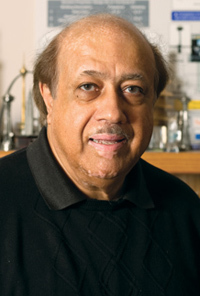
Ahsan Kareem, the Robert Moran Professor of Civil Engineering and Geological Sciences at the University of Notre Dame, has been identified as one of seven honorees to be inducted into the American Society of Civil Engineers (ASCE) Offshore Technology Conference (OTC) Hall of Fame during the annual conference next month at a gala dinner held at the Petroleum Club in Houston.
The gala honors the authors of extraordinary papers presented in the early years of the OTC, which now form the core of current practice worldwide. The foremost event in offshore technology, the conference attracts more than 65,000 industry and research leaders each year.
The seven leaders named to the 2011 Hall of Fame were chosen on the basis of their innovation, direction and lasting impact on the design, construction or installation of offshore infrastructure. Many of the OTC papers have straddled the divides to become an integral part of the design process of other categories of structures such as buildings and bridges. Kareem’s selection was based on his paper, titled “Dynamic Effects of Wind on Offshore Platforms,” in which he discussed the need and framework to address dynamic wind loads on the new breed deepwater offshore platforms, which were going to be sensitive to both wind and waves, thus affecting design loads.
Kareem currently serves as the director of Notre Dame’s NatHaz Modeling Laboratory, where he specializes in probabilistic structural dynamics, fluid-structure interactions, structural safety, and the mitigation of natural hazards. He uses computer models and laboratory and full-scale experiments to study the dynamic effects of environmental loads under winds, waves and earthquakes on structures and to develop mitigation strategies to enhance the performance and safety of structures, as well as to better understand and predict the impact of natural hazards on the constructed environment. He has been a Notre Dame faculty member since 1990.
In addition to this most recent honor, Kareem has made a major impact in advancing the state-of-the-art in wind effects on structures through the characterization and formulation of wind load effects. He has spearheaded redevelopment of ASCE standards for wind-sensitive structures — specifically ASCE 7, which outlines the minimum design loads for the safety of buildings and other structures, such as bridges — and advancement of the code’s global implementation as a benchmark standard. His work has led to the development of e-technologies for web-enabled analysis and design of structures and establishment of a cyber-based collaboratory for research and education in wind effects.
Beyond his research, Kareem has distinguished himself as a leader within the structural engineering community through his service as first president of the American Association for Wind Engineering, as editor-in-chief of the International Journal of Wind and Structures, associate editor of the Journal of Structural Engineering and Journal of Engineering Mechanics and service on many advisory panels of the National Research Council, National Science Foundation and industry.
Among his other honors are selections as an honorary professor at Tongji University, Shanghai, China; an ASCE distinguished member; election as a member of the U.S. National Academy of Engineering and a foreign fellow of the Indian National Academy of Engineering, receipt of the ASCE’s State-of-the-Art award for scholarly contributions to full-scale monitoring of tall buildings and selection as the inaugural recipient of the Alan G. Davenport Medal, presented by the International Association for Wind Engineering in recognition of his distinguished achievement in the dynamic wind effects on structures.
Kareem also has received the Robert H. Scanlan Medal for outstanding original contributions to the study of wind-load effects on structural design and the Jack E. Cermak Medal in recognition of his contributions to the study of wind effects on structures. His receipt of the Davenport, Scanlan and Cermak medals is unmatched recognition in his field.
With a focus on structural and fluid dynamics, Kareem received his doctorate in civil engineering from Colorado State University. He earned his master’s degree in structural engineering from the University of Hawaii through a joint program with the Massachusetts Institute of Technology, and he received his bachelor‘s degree (with distinction) from the West Pakistan University of Engineering.
Originally published by at newsinfo.nd.edu on April 15, 2011.